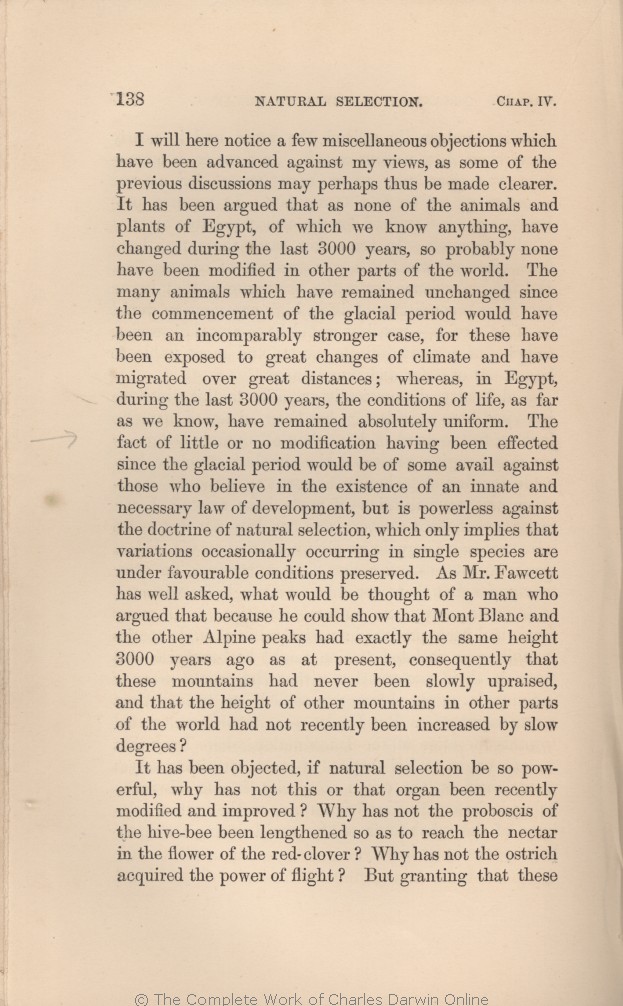I will here notice a few miscellaneous objections which have been advanced against my views, as some of the previous discussions may perhaps thus be made
clearer. | clearer. 1861 |
| clearer; but it would be useless to discuss all of them, as they have been made by writers who have not taken the trouble to understand my views. 1866 |
| clearer; but it would be useless to discuss all of them, as many have been made by writers who have not taken the trouble to understand my views. 1869 |
| 2 blocks not present in 1859 1860 1861 1872; present in 1866 1869 | | Thus a distinguished German naturalist has recently asserted that the weakest part of my theory is, that I consider all organic beings as imperfect: what I have really said is, that all are not as perfect in relation to the
conditions under which they live,
as they might be; and this is shown to be the case by so many native forms yielding their places in many quarters of the world
to intruding and naturalised foreigners.
Nor can all organic beings, even if at
any one time perfectly adapted to their conditions of life, remain so, when these
conditions slowly change;
and
no one will dispute that the physical conditions of each country, as well as the number
and kind
of its inhabitants, are liable to change.
|
| 4 blocks not present in 1859 1860 1861 1869 1872; present in 1866 | | Thus again, a French author, in opposition to the whole tenor of this volume, assumes that, according to my view, species undergo great and abrupt changes, and then he triumphantly asks how this is possible, seeing that such modified forms would be crossed by the many which have remained unchanged.
No doubt the small changes or variations which do occur are incessantly checked and retarded by intercrossing; but the frequent existence of varieties in the same country with the parent species shows that crossing does not necessarily prevent their formation; and in the still more frequent cases of local forms or geographical races, crossing cannot come into play.
It should also be borne in mind that the offspring from a cross between a modified and unmodified species tends partially to inherit the characters of both parents, and natural selection assuredly will preserve even slight approaches to any change of structure which is beneficial.
Moreover such crossed offspring, from partaking of the same constitution with the modified parent, and from being still exposed to the same conditions, will be far more liable than other individuals of the same species again to vary or be modified in a similar manner.
|
| other 1861 | | any other 1866 1869 |
| the existence of 1861 1866 |
| OMIT 1869 |
| selection, 1861 1866 | | selection 1869 |
| which only implies 1861 |
| which implies only 1866 |
| or the survival of the fittest, which implies only 1869 |
| occasionally occurring in single species are under favourable conditions preserved. 1861 |
| occasionally occur in single species, and that these when favourable are preserved; but this will occur only at long intervals of time after changes in the conditions of each country. 1866 |
| or individual differences of a favourable nature occasionally arise in a few species, and are then preserved. 1869 |
|









